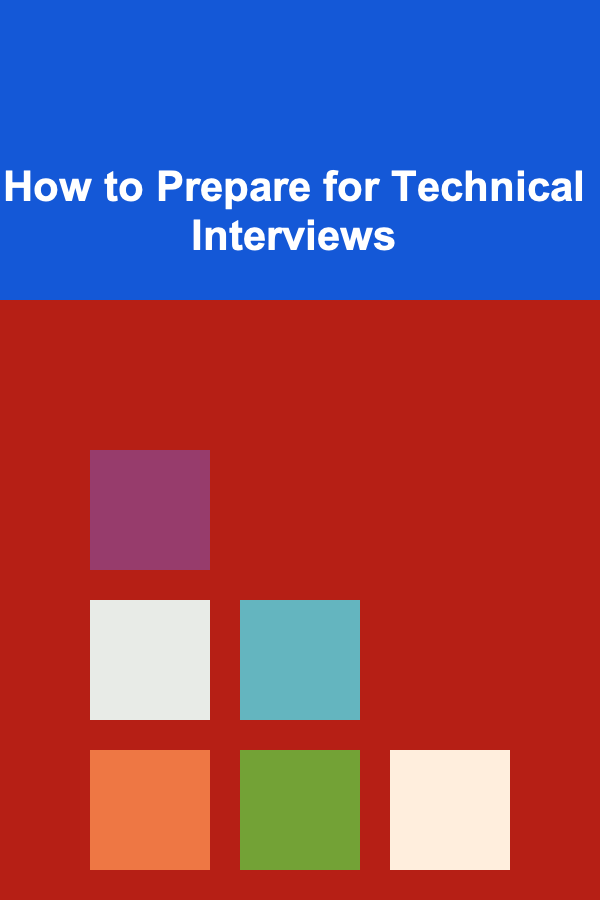
How to Prepare for Technical Interviews
ebook include PDF & Audio bundle (Micro Guide)
$12.99$8.99
Limited Time Offer! Order within the next:

Technical interviews are often one of the most challenging and stressful aspects of the hiring process, especially for roles in software engineering, data science, and similar fields. Preparing adequately for these interviews is crucial for demonstrating your skills, problem-solving ability, and aptitude to work under pressure. Whether you're a student entering the job market or a seasoned professional transitioning to a new role, understanding how to approach technical interviews is a key component of success.
In this article, we will delve into comprehensive strategies for preparing for technical interviews. From understanding the interview process to developing problem-solving skills, coding practice, and mastering key concepts, we'll cover everything you need to know to excel in these interviews.
Understanding the Technical Interview Process
Before diving into the specifics of preparation, it's important to understand the structure and expectations of technical interviews. These interviews typically consist of several rounds, each testing different aspects of your technical abilities and your problem-solving approach.
Common Phases of a Technical Interview
-
Phone Screen or Initial Assessment: The first round is often a phone screen or a brief technical assessment. This round is designed to gauge your basic technical knowledge and your ability to communicate effectively. You might be asked to solve simple algorithmic problems, answer questions about your previous experience, or discuss basic concepts in programming.
-
Coding Challenge/Take-Home Assignment: Some companies may ask you to complete a coding challenge or a take-home assignment before the formal interview. These tasks typically involve writing a solution to a problem and submitting your code for review. The challenge might be timed, and it tests your ability to write clean, efficient, and bug-free code under pressure.
-
On-Site Technical Interviews: If you pass the initial rounds, you'll likely be invited for an on-site interview. This is where the bulk of the technical assessment happens. On-site interviews usually consist of several rounds, including:
- Algorithm and Data Structure Problems: You will be asked to solve problems that test your understanding of algorithms and data structures.
- System Design: Here, you'll be tasked with designing a system or solving a more complex problem that involves scalability, performance, and architecture.
- Behavioral Questions: In addition to technical questions, you may be asked behavioral questions to assess how you fit within the company culture and how you approach team collaboration and conflict resolution.
-
Final Interviews: This round may involve a combination of deeper technical assessments and interviews with higher-level executives or team leads. Some companies may also conduct a cultural fit interview, focusing on values and teamwork rather than purely technical expertise.
Step 1: Master the Fundamentals
No matter how experienced you are, it's essential to ensure that your fundamental knowledge is solid. Many technical interviews revolve around understanding core concepts that apply to various coding problems. The interviewers want to see that you can apply fundamental principles to solve complex problems efficiently.
Key Concepts to Master
-
Data Structures: Understanding data structures is crucial for solving algorithmic problems. Some of the most important data structures to focus on include:
- Arrays
- Linked Lists
- Stacks and Queues
- Hash Tables (Hash Maps)
- Trees (Binary Trees, Binary Search Trees, AVL Trees, etc.)
- Graphs
- Heaps/Priority Queues
-
Algorithms: Algorithms form the backbone of coding problems. Having a strong grasp of different algorithms and their use cases is essential. Focus on the following:
- Sorting algorithms (Quick Sort, Merge Sort, Insertion Sort, etc.)
- Searching algorithms (Binary Search, Linear Search)
- Graph algorithms (BFS, DFS, Dijkstra's Algorithm, etc.)
- Dynamic Programming (Knapsack, Longest Common Subsequence, etc.)
- Divide and Conquer
- Greedy Algorithms
- Backtracking
-
Time and Space Complexity: Be prepared to analyze the time and space complexity of your solutions. Knowing Big O notation and understanding how to optimize your code is a critical skill that interviewers look for. Practice identifying the complexity of your solutions and finding ways to improve them.
-
Concurrency and Multi-threading: For some technical roles, especially in large-scale applications, concurrency is a key area. Be familiar with concepts such as threads, synchronization, deadlock, race conditions, and parallel processing.
-
Operating Systems: A basic understanding of how operating systems work can be helpful, especially for positions related to low-level programming. Concepts like memory management, file systems, processes, and network protocols might come up during interviews.
Step 2: Practice Problem-Solving
The best way to prepare for a technical interview is by solving problems. The more problems you solve, the better you'll become at recognizing patterns and identifying efficient solutions. Regular practice is crucial to your success.
Where to Practice
-
LeetCode: LeetCode is one of the most popular platforms for coding practice. It offers a wide variety of problems that mirror the types of questions you may encounter in technical interviews. The platform also provides a community where users discuss optimal solutions, which is a great way to learn from others.
-
HackerRank: HackerRank is another excellent resource for coding challenges. It also has tutorials and practice exercises in algorithms, data structures, and specific programming languages.
-
CodeSignal: CodeSignal offers coding assessments similar to those used by many tech companies. It's a great way to test your skills in real-world scenarios.
-
Exercism: Exercism is a platform that offers practice problems in multiple programming languages. It provides feedback from mentors, which can be especially valuable for improving your coding style and problem-solving approach.
Problem-Solving Strategies
When practicing coding problems, it's important to focus not just on solving them but on doing so efficiently and with clarity. Here are some strategies to follow:
-
Understand the Problem: Before jumping into the code, take time to read the problem thoroughly and make sure you understand it. Clarify any ambiguities and make sure you know the inputs and expected outputs.
-
Plan Your Approach: Think about the problem-solving approach before coding. Consider which algorithms or data structures might be appropriate for the problem. Break the problem down into smaller components if necessary.
-
Write Pseudocode: Writing pseudocode before implementing the solution can help clarify your approach. This step ensures that you're solving the problem logically before diving into actual code.
-
Test with Sample Inputs: After implementing your solution, test it with both provided inputs and edge cases. Don't just rely on the sample test cases---come up with your own test cases to ensure your solution works in all scenarios.
-
Refactor Your Code: After solving a problem, take a step back and review your code. Look for any inefficiencies or areas where you can improve the structure or readability of your code. Practice writing clean, readable code that adheres to best practices.
Step 3: System Design Preparation
For many senior-level technical roles, system design interviews are a key part of the process. These interviews test your ability to design large-scale systems that are scalable, maintainable, and efficient.
Key Concepts in System Design
-
Scalability: Be prepared to discuss how your system will scale as the number of users or data grows. Consider techniques like load balancing, sharding, and horizontal scaling.
-
Database Design: Understand how to design both relational and non-relational databases. Be prepared to discuss database normalization, indexing, caching, and optimization strategies.
-
Fault Tolerance and Reliability: Know how to design a system that is fault-tolerant and can handle failures gracefully. Concepts like replication, redundancy, and consistency are important in these discussions.
-
Microservices and Monolithic Architectures: Understand the difference between microservices and monolithic architectures. Be prepared to discuss when to use each and the trade-offs involved.
-
APIs and Communication Protocols: Know how to design and implement APIs, including RESTful services and WebSockets. Familiarity with common communication protocols like HTTP, TCP/IP, and gRPC is essential.
Practice System Design
To practice system design, it's helpful to walk through real-world systems. Try designing systems like:
- A URL shortening service (like Bit.ly)
- A social media platform (like Facebook)
- An e-commerce system (like Amazon)
- A file storage system (like Dropbox)
Use mock interviews, online resources, or books like Designing Data-Intensive Applications by Martin Kleppmann to learn about the nuances of system design.
Step 4: Mock Interviews
Participating in mock interviews is one of the best ways to prepare for the real thing. Mock interviews simulate the pressure and format of an actual interview, helping you build confidence and get comfortable with answering questions under time constraints.
Platforms for Mock Interviews
-
Pramp: Pramp offers free mock interviews with peers. It's an excellent way to get real-time feedback and practice communication skills in a technical interview setting.
-
Interviewing.io : Interviewing.io provides mock technical interviews with engineers from top tech companies. The platform allows you to practice coding, system design, and behavioral interviews.
-
Exercism Mentorship: While Exercism focuses primarily on coding practice, it also has a mentorship feature that can help simulate technical discussions and get feedback from mentors.
Step 5: Prepare for Behavioral Questions
Technical interviews are not just about coding---they also assess your soft skills, including communication, problem-solving, and teamwork. Prepare for common behavioral questions like:
- Tell me about a time you faced a challenge at work and how you overcame it.
- Describe a time when you worked on a team project and how you contributed.
- How do you approach debugging a difficult problem?
The STAR method (Situation, Task, Action, Result) is a helpful framework for answering these questions clearly and concisely.
Step 6: Stay Calm and Confident
On the day of the interview, it's important to stay calm and maintain confidence. Remember that interviews are not just about getting the answer right---they are about demonstrating your problem-solving process and how you approach challenges. Take your time, think out loud, and don't be afraid to ask clarifying questions.
Conclusion
Preparing for technical interviews requires a blend of technical knowledge, problem-solving skills, and strategic planning. By mastering the fundamentals, practicing coding problems, preparing for system design, and engaging in mock interviews, you can build the skills necessary to perform well in technical interviews. With consistent effort, patience, and the right mindset, you'll increase your chances of success and secure the job you desire. Good luck!

How to Create a Statement Lighting Fixture in Your Home
Read More
How to Create an Inviting Dining Area for Entertaining
Read More
How to Install Soundproofing Materials in Your Home
Read More
How to Teach Your Kids to Build and Decorate Birdhouses as a Family Project
Read More
Leveraging Social Media for Community Building: A Comprehensive Guide
Read More
10 Tips for a Movie Night Checklist on a Budget: Fun Without Breaking the Bank
Read MoreOther Products

How to Create a Statement Lighting Fixture in Your Home
Read More
How to Create an Inviting Dining Area for Entertaining
Read More
How to Install Soundproofing Materials in Your Home
Read More
How to Teach Your Kids to Build and Decorate Birdhouses as a Family Project
Read More
Leveraging Social Media for Community Building: A Comprehensive Guide
Read More